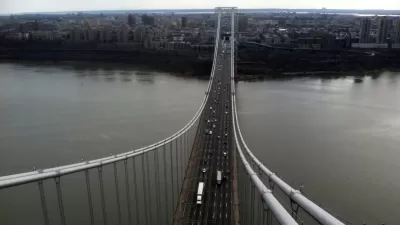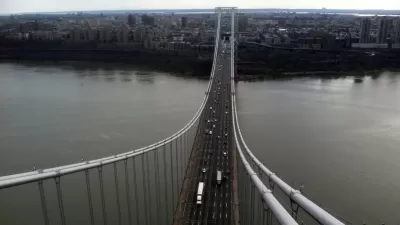In The New York Times Sunday Review, Matt Katz, a political reporter for WNYC and New Jersey Public Radio, gives an update on the federal trial for 'Bridgegate' and also paints a bleak picture for New Jersey, and maybe the United States.

Bridgegate, aka the George Washington Bridge lane closure scandal, began on September 9, 2013, with the closure of access lanes off the busiest bridge in the United States to Fort Lee, N.J. Initially Gov. Chris Christie's staff and his appointees to the Port Authority of New York and New Jersey claimed it was part of a traffic study, but an alternative explanation was offered by the infamous email, "time for some traffic problems in Fort Lee."
The reason for the lane closures has been shown to be political retribution against the Democratic mayor of Fort Lee, Mark Sokolich, for not endorsing the Republican governor in his 2013 reelection to a second term.
A lengthy investigation by the state legislature and the Port Authority ensued, but it is the federal investigation that began in January 2014 by the United States Attorney for the District of New Jersey (U.S. Department of Justice), Paul J. Fishman, ironically Christie's former position before running for governor, that is now the center of attention.
To be sure, Christie is not being charged by Fishman's office. But his claims that he was unaware of the lane closures have been disputed by witnesses.
Christie left the U.S. Attorney's office in 2008 and ran for governor of New Jersey the next year, "vowing to clean up the state," writes Katz.
But over the past two weeks, a federal corruption trial in Newark has made it disappointingly clear that the governor failed. As it has turned out, Mr. Christie, who is now running Donald J. Trump’s transition team to fill top jobs should Mr. Trump win the White House, ended up tarnishing his own administration.
The trial has put into stark relief the corruption that seems rife in New Jersey politics. If the lawman Chris Christie couldn’t fix it — if he could, in fact, turn government into a taxpayer-funded organ of his political ambitions — then who’s to save the Garden State?
Damage goes beyond the Garden State
He’ll leave behind a deeply wounded Port Authority, with higher tolls and decaying infrastructure. Mr. Christie and Gov. Andrew M. Cuomo of New York jointly vetoed bills to reform the agency, so the potential remains for it to continue to be co-opted by the political and personal interests of wealthy insiders like David Samson, the former Port Authority chairman and state attorney general [who pleaded guilty to bribery charges], and a father figure to Mr. Christie.
National implications?
In addition to heading Trump's transition team should Trump become president, Katz writes that Trump has already hired "two former Christie aides who were deeply involved in [Christie's reelection] endorsement courtships."
Katz warns, "New Jersey-style politics may soon go national."
More on Katz:
Matt Katz is the author of “American Governor: Chris Christie’s Bridge to Redemption."
In 2015 Matt and a team from WNYC won a Peabody Award for their coverage of Christie and the Bridgegate scandal. The series -- "Chris Christie, White House Ambitions and the Abuse of Power" -- was WNYC's first Peabody for news coverage since 1944, when the station won for Mayor Fiorello LaGuardia's weekly addresses to New York City.
FULL STORY: Corruption in the Soprano State

Study: Maui’s Plan to Convert Vacation Rentals to Long-Term Housing Could Cause Nearly $1 Billion Economic Loss
The plan would reduce visitor accommodation by 25,% resulting in 1,900 jobs lost.

North Texas Transit Leaders Tout Benefits of TOD for Growing Region
At a summit focused on transit-oriented development, policymakers discussed how North Texas’ expanded light rail system can serve as a tool for economic growth.

Why Should We Subsidize Public Transportation?
Many public transit agencies face financial stress due to rising costs, declining fare revenue, and declining subsidies. Transit advocates must provide a strong business case for increasing public transit funding.

Dear Tesla Driver: “It’s not You, It’s Him.”
Amidst a booming bumper sticker industry, one writer offers solace to those asking, “Does this car make me look fascist?”

A Visual Celebration of Manhattan’s Chinatown Elder Community, Through Food
Lanterns, cafeteria trays, and community connection take center stage in this stunning photo essay.

How to Make US Trains Faster
Changes to boarding platforms and a switch to electric trains could improve U.S. passenger rail service without the added cost of high-speed rail.
Urban Design for Planners 1: Software Tools
This six-course series explores essential urban design concepts using open source software and equips planners with the tools they need to participate fully in the urban design process.
Planning for Universal Design
Learn the tools for implementing Universal Design in planning regulations.
City of Santa Clarita
Ascent Environmental
Institute for Housing and Urban Development Studies (IHS)
City of Grandview
Harvard GSD Executive Education
Toledo-Lucas County Plan Commissions
Salt Lake City
NYU Wagner Graduate School of Public Service



























